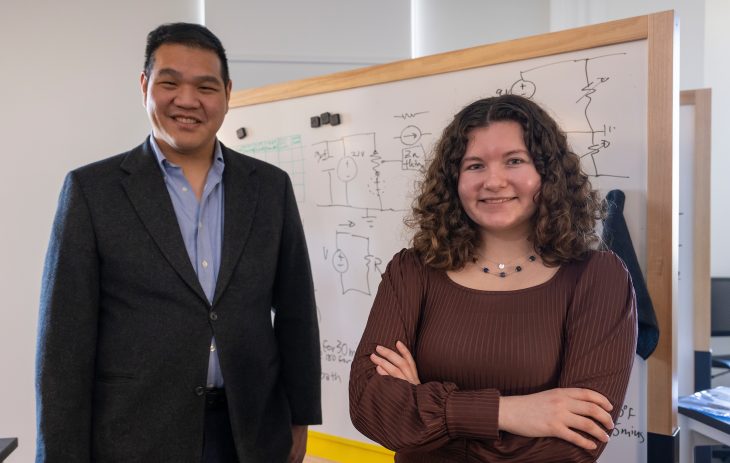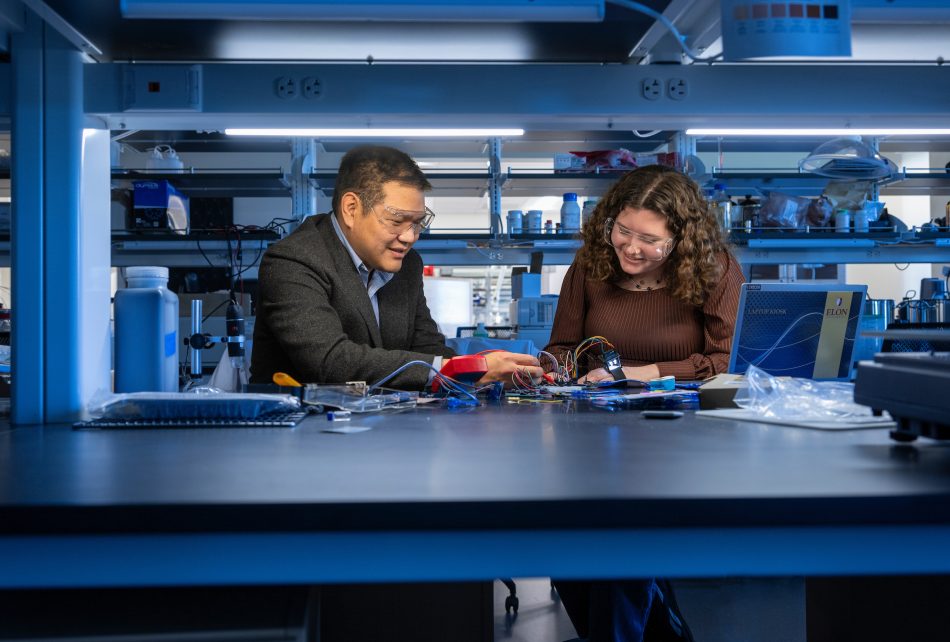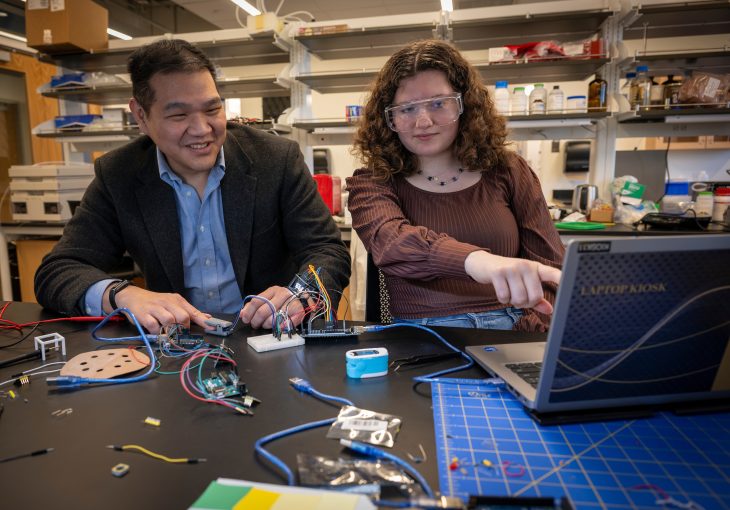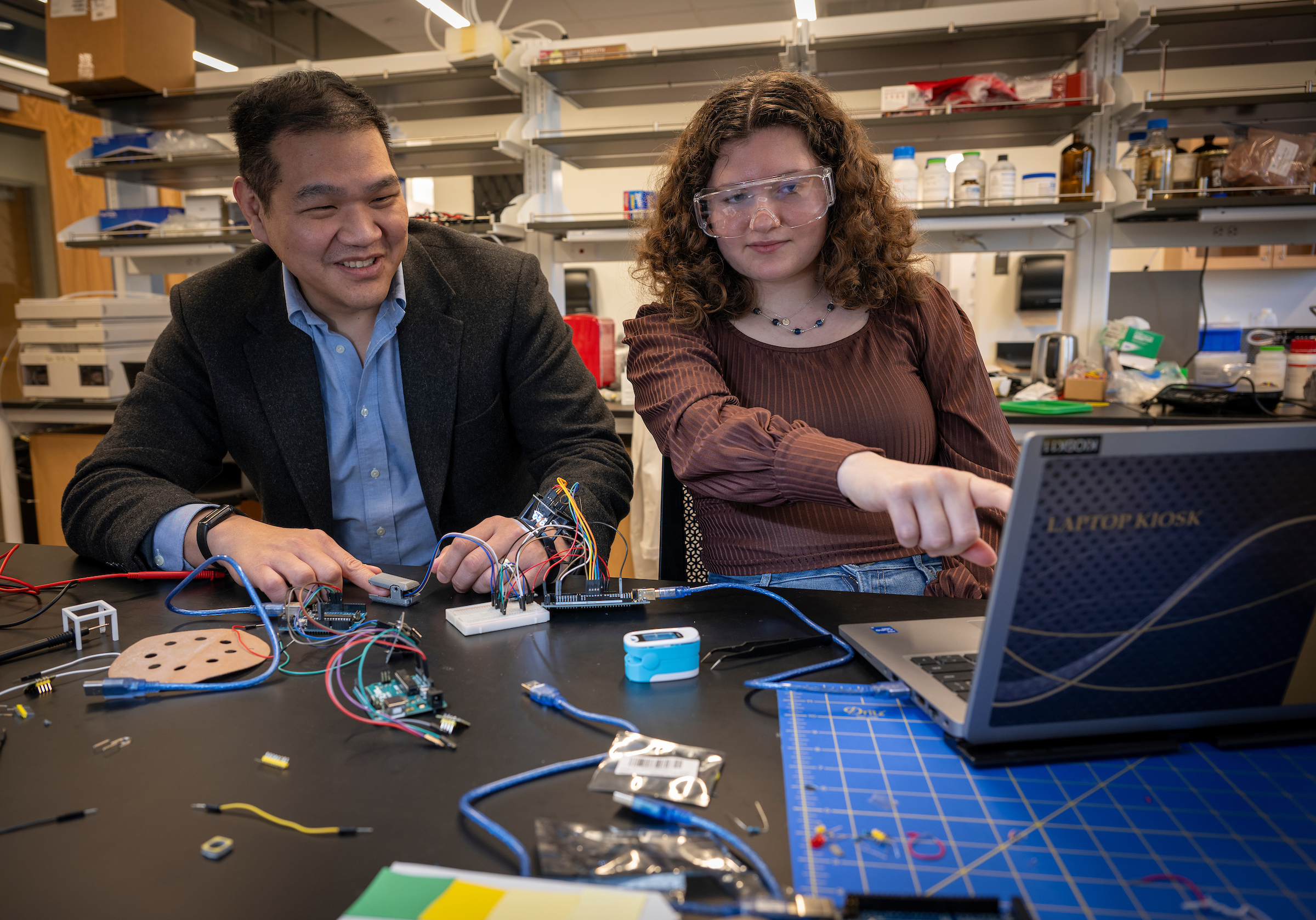Through her Lumen Prize research, Krause has developed a prototype that could help address the shortcomings of an important health care tool.
Vivian Krause ’24 had a decision to make. As a high school senior, she knew she wanted to pursue research as an undergraduate and had decided to focus on engineering. Among her college choices were very large state schools with expansive research programs, and then there was Elon University.
Krause chose Elon, and across the past four years, she has taken advantage of the opportunity to marry multiple personal passions and interests in a way that has made her stand out both on campus and within the broader field of biomedical engineering. She quickly immersed herself in research and carved out a research focus that was uniquely her own at Elon while equipping herself with the skills and experiences that have put her ahead of many of the peers she will have in graduate school.
“Elon was very, very different from the schools I was choosing from,” Krause said. “I feel like I’ve been able to engage all aspects of my passions here.”

Krause is a recipient of the Lumen Prize, Elon’s most prestigious award for undergraduate research and awards scholars a $20,000 scholarship to support a chosen research project and allows the scholar to work closely with a faculty mentor on that project for two years. Each year, 15 rising juniors are named Lumen Scholars and conduct research that often produces conference presentations and publications.
In close partnership with her Lumen Prize mentor, Assistant Professor of Engineering Jonathan Su, Krause has built a unique research path as she has developed a prototype for a pulse oximeter that accounts for the color of a person’s skin when calculating their oxygen levels. It’s a project designed to address a lack of accuracy that negatively impacted people with darker skin colors during the COVID-19 pandemic, an impact she saw firsthand working with a health care worker in Alamance County communities.
She has developed a prototype of pulse oximeter that can measure a person’s skin tone and use that data to produce a more accurate reading. Along with being a common tool to measure a person’s vital signs, pulse oximeters were crucial during the COVID-19 pandemic because of their ability to see how the virus was impacting the oxygen saturation levels in a patient’s blood.
She’s been able to draw upon the expertise of Su and others in the Department of Engineering to create a project that is her own, which is very different from joining a research lab that is pursuing an existing research focus. “I have entire ownership over this project,” Krause said. “In grad school interviews, I heard from interviewers that they were impressed to see an undergraduate have this level of ownership of this sort of project.”
Research through service
At Elon, Krause has found an environment that provides her with opportunities to do more than just pursue an engineering degree and conduct research. Those opportunities are what drew her to the university in the first place.
“I do like building things, I do like math and I like science, but I also like being more creative,” Krause said. “I am really passionate about social justice. The program at Elon spoke to me because it’s very well-rounded.”
Outside the classroom, she has been deeply involved in the Kernodle Center for Civic Life, first as a student worker and later as a service ambassador. It was her desire to incorporate service into her academic experience that helped pave the way for her Lumen Prize research focus.

Through the Engineering Design for Service course she took in fall 2021, she worked with a local health care worker who regularly used a pulse oximeter regular and had notice that there was a discrepancy in how accurate the oximeter was depending upon who her clients were. Krause began researching the issue and found confirmation that pulse oximeters were less reliable when used on people with darker skin tones because they were likely to overestimate the oxygenation levels. That would reduce the likelihood that they could identify a person who was in crisis because of low oxygenation levels.
“A lot of sources theorized that the unreliability of pulse oximeters could have impacted health disparities and health outcomes during the COVID pandemic for people of color,” Krause said.
That initial work in addressing the issue would grow into Krause’s Lumen research in partnership with Su, who she first met during a visit to campus as a prospective student and who had already become a mentor to her. During Krause’s first year, Krause had a “journal club” with Su through which Krause would read various engineering journal articles and the pair would come together to discuss them. Su was impressed by her ability to process and absorb complex engineering concepts detailed in the journal articles so early in her academic career.

“It’s unusual for someone to be this independent so early,” Su said. “She came in very motivated and has been able to learn so much.”
Krause conducted a simulation to see how different skin tones absorb red light, which is used within the pulse oximeter to measure oxygenation levels. Using mathematical modeling, she was able to estimate the probability that a person’s skin tone would impact the accuracy of the pulse oximeter. By pairing an arduino, which is an open-source electronics platform with the existing sensor in a pulse oximeter and a skin tone recognition sensor she designed, she created a prototype that would automatically adjust the oxygenation reading to take into account the skin tone-based shift.
From Mentee to Mentor
Through not just her Lumen Prize research but throughout her time at Elon, Krause has benefitted from the supportive mentorship of Su. “I feel like Dr. Su has been a constant in my life at Elon,” Krause said.
If the pair gets stuck working through some aspect of the research, they’ve been able to quickly turn to external research, process it and come back together to find a solution. Krause is relatively new to electronics and programming languages, and has been able to lean on Su as well as others in the department for guidance.
“He is so helpful, especially when I get stuck,” Krause said. “It’s so helpful to have a resource like him at this point in my career.”
Krause has taken her experiences with her own mentors, and is passing along what she has learned to younger students as an Elon 101 peer educator for the Engineering Fellows cohort with the guidance of John Ring, director of engineering outreach, who also serves as Krause’s academic adviser. Krause was in the initial cohort of Engineering Fellows at Elon, and has been part of the initiative to pair first-year students with older students. “That has really fostered by appreciation for mentorship and really wanting to incorporate mentorship throughout my time at Elon and my future career as well,” Krause said.



